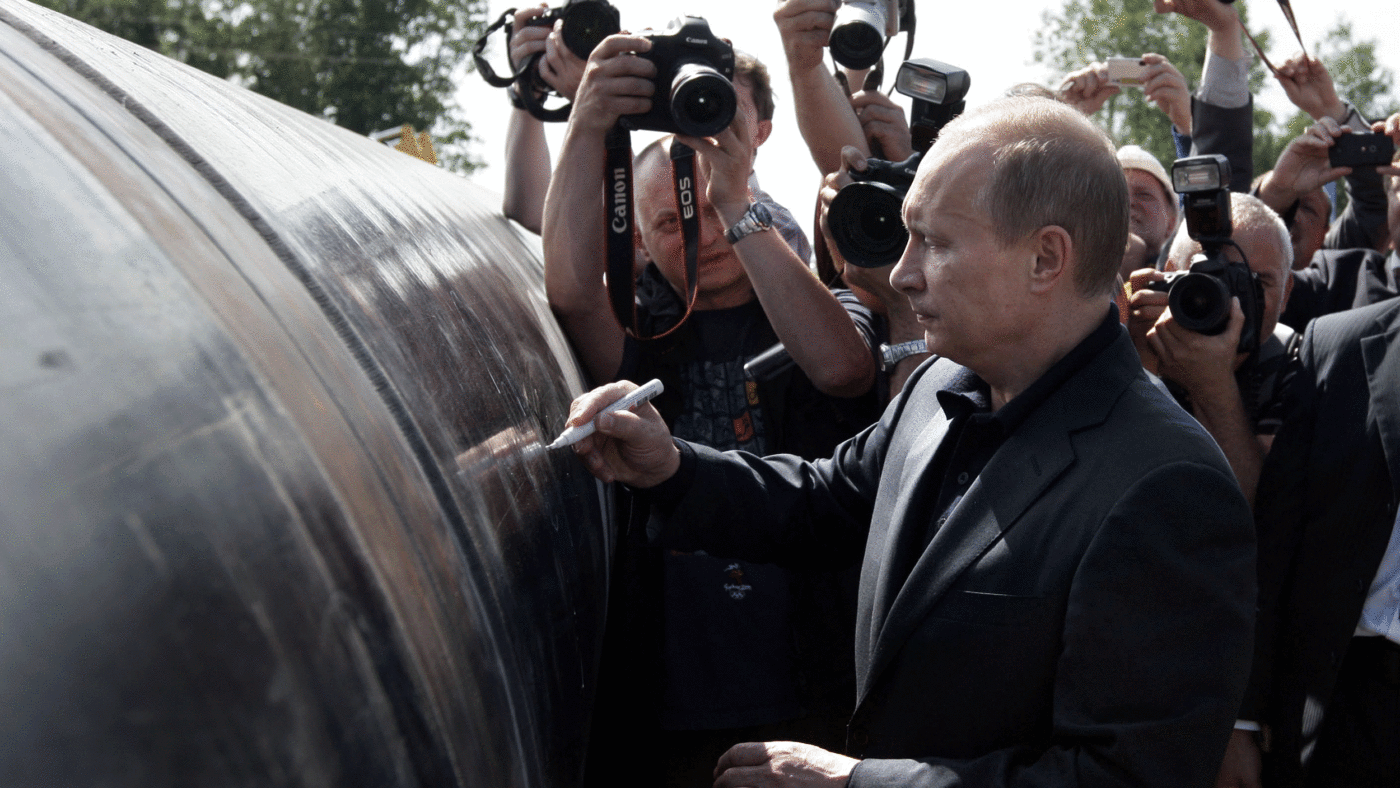As Ofgem announces an 54% rise in the energy price cap, many Brits will be nervously contemplating about what it means for their household finances. But the energy crisis also has bigger, global consequences that touch on everything from climate change to inflation, to the rules-based world order.
The current gas price spike highlights just how important energy security is in our closely connected global economy. It’s at the heart of the breakdown in the relationship between the US and Europe. There are two sides to every divorce. Generally, Americans are staggered at just how stupid European nations have been in their energy policies. In particular, by engaging so directly with Putin’s Russia, they have abandoned the shared vision of democracy and capitalism that has been so successful since the war.
The key culprits are the EU’s two leading nations, France and Germany. While both have failed to secure their energy, the French are setting up Europe to deal directly with Russia, without the USA. The Germans are playing their own game of naked self-interest with both Russia and China. Oh, and both are blaming the Brits for pulling out and destabilising the whole thing. Americans, meanwhile, believe the perfidious Europeans have betrayed their transatlantic alliance.
On the other hand, Europe blames the disintegrating Atlantic Alliance on America. Successive US administrations have left Europe marginalised. George W Bush regarded them as second-tier allies to be bullied. Barack Obama’s Asia pivot proved he was uninterested in the continent. Donald Trump was downright rude and insulting, which Germany and France will never forget. Joe Biden simply looks weak. He will likely be followed by some iteration of Trump 2.0, which would in turn probably spell deeper aggressive protectionism and the de facto end of the Atlantic alliance.
Game, set and match to China and Russia?
It could all have been so different. In the 2010s, the shale and fracking revolution raised the prospect of the US becoming a net exporter of cheap oil and gas. That could have heralded a significant strengthening of transatlantic relationships and freed Europe from reliance on more dubious suppliers. As Obama’s Secretary of State, Hillary Clinton pushed hard for European energy security. Many European states including Spain, the UK, Poland and France built new liquefied natural import facilities, but plans to develop LNG as a key strategic resource never really developed.
Of course, it doesn’t help that Angela Merkel doomed Germany to energy insecurity by shutting down its nuclear power plants and disinvested Germany from the LNG project in favour of Russian gas, leaving Germany now dependent on firing up coal stations. The British aren’t much better, deciding to entrust energy security to the market, rather than maintain gas storage facilities. Today, it doesn’t help that Germany’s new government has the political maturity of a three-year-old child with little commonality on priorities between the coalition parties.
At the epicentre of these shifting tectonic plates is Ukraine. Call it blackmail or call it business, but Russia doesn’t need Europe’s gas market. It’s got a willing new partner in China. Long-term, I don’t expect the Russia/China partnership to last long, but long enough to change the world and cause ructions in the West. Like all unanticipated consequences, we haven’t figured out just how significant the breakdown in energy politics between Europe and the US could prove to be.
The fault lines that the issue of energy security have exposed are even more worrying for Europe. Whatever Brussels thinks, there is no consensus among the nations of the European Union on basic matters such as a common voice in diplomacy, and certainly not in energy security. It’s exposed the problem at the core of Europe: Europe needs to speak with a single clear voice, but no nation is willing to compromise its sovereignty.
The only commonality between EU members is their apparent ability to get their energy security wrong. There is minimal alignment on trade policy either, meaning Germany is dancing to its own tunes with China and Russia, while other nations don’t have a clue what happens next. UK arms shipments to Ukraine are being flown around Germany just in case the new German traffic light coalition gets upset at the prospect of upsetting Russia.
This year will likely expose all the inconsistencies at the heart of the European project, especially in debt. Brussels is flexing its muscles over its control of European financial sovereignty, making clear to financial wastrels like Italy that access to European recovery funds come at the cost of meeting Brussels’ targets.
Italy has increased its national debt by 21% over the past two years, despite promising to reduce it. Greece is up 20%, while Spain’s debt grew by 26%. In Italy’s case, youth unemployment remains over 25%, with the full unemployment level stuck at 10% in a no-growth economy where the size of the untaxed black economy is approaching €200bn. Nothing is fixed and Germany remains unwilling to pay Italian and French pensions and will insist on higher rates and austerity.
I watched hours of pre-match analysis on the coming Ukraine/Russia war the other night. Scary stuff, and it struck me very clearly. Putin doesn’t need to invade Ukraine. The damage is already done.
Click here to subscribe to our daily briefing – the best pieces from CapX and across the web.
CapX depends on the generosity of its readers. If you value what we do, please consider making a donation.


